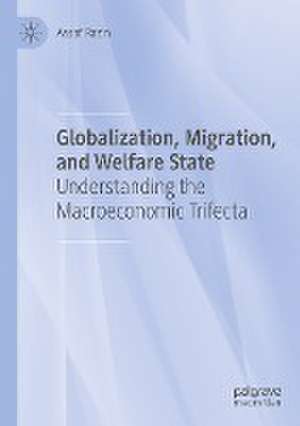Globalization, Migration, and Welfare State: Understanding the Macroeconomic Trifecta
Autor Assaf Razinen Limba Engleză Paperback – 27 ian 2022
| Toate formatele și edițiile | Preț | Express |
|---|---|---|
| Paperback (1) | 722.58 lei 6-8 săpt. | |
| Springer International Publishing – 27 ian 2022 | 722.58 lei 6-8 săpt. | |
| Hardback (1) | 726.69 lei 6-8 săpt. | |
| Springer International Publishing – 26 ian 2021 | 726.69 lei 6-8 săpt. |
Preț: 722.58 lei
Preț vechi: 881.19 lei
-18% Nou
Puncte Express: 1084
Preț estimativ în valută:
138.26€ • 150.66$ • 116.51£
138.26€ • 150.66$ • 116.51£
Carte tipărită la comandă
Livrare economică 24 aprilie-08 mai
Preluare comenzi: 021 569.72.76
Specificații
ISBN-13: 9783030643942
ISBN-10: 3030643948
Ilustrații: XXIX, 191 p. 53 illus., 50 illus. in color.
Dimensiuni: 148 x 210 mm
Greutate: 0.3 kg
Ediția:1st ed. 2021
Editura: Springer International Publishing
Colecția Palgrave Macmillan
Locul publicării:Cham, Switzerland
ISBN-10: 3030643948
Ilustrații: XXIX, 191 p. 53 illus., 50 illus. in color.
Dimensiuni: 148 x 210 mm
Greutate: 0.3 kg
Ediția:1st ed. 2021
Editura: Springer International Publishing
Colecția Palgrave Macmillan
Locul publicării:Cham, Switzerland
Cuprins
Chapter 1 Introducing Pandemic Crisis.- Chapter 2 Migration and Welfare-State Policy.- Chapter 3 Globalization and Welfare-State Policy.- Chapter 4 Free Migration: Israel’s Experience.- Chapter 5 Globalization: Israel’s Experience.- Chapter 6 Federal Systems: US-EU Comparison.
Notă biografică
Assaf Razin is Schwartz Professor Emeritus of Tel-Aviv University, Israel, and former Friedman Professor of International Economics at Cornell University, USA. He received Israel’s EMET Prize in economics in 2017. His latest book is Israel and the World Economy: The Power of Globalization (MIT Press, 2018).
Textul de pe ultima copertă
This book is about three key dimensions in economics—globalization, migration and the welfare state—that are of enduring interest. These issues are particularly important to consider at the present moment given the strains posed by the pandemic: there is at least a temporary setback to trade-globalization and migration, and the cost of fighting the pandemic will strain the ability of governments to provide welfare state services in a style and scope to which many of their citizens have become accustomed. The book explains the changing function of the welfare state in the presence of intensified globalization, or de-globalization, forces. The welfare state’s policy-maker attitudes toward openness and migration depend on open-economy fundamentals, and the income class it represents. The author demonstrates the interactions between migration, globalization and macroeconomic policy in practice, using real-world unique episodes, with Israel deemed as well-functioning trifecta, and the US and Europe as imperfectly functioning trifecta.
Assaf Razin is Schwartz Professor Emeritus of Tel-Aviv University, Israel, and former Friedman Professor of International Economics at Cornell University, USA. He received Israel’s EMET Prize in economics in 2017. His latest book is Israel and the World Economy: The Power of Globalization (MIT Press, 2018).
Caracteristici
Explores three key dimensions of economics--globalization, migration, and the welfare state Explores the complex relationship between international economics and welfare-state policy Applies Israel, the United States, and Europe as revealing case studies
